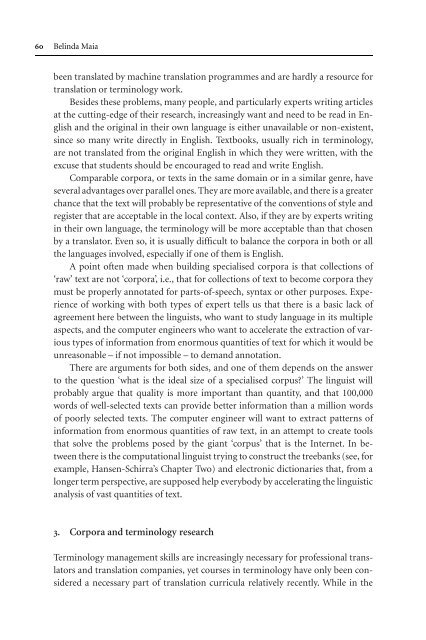Topics in Language Resources for Translation ... - ymerleksi - home
Topics in Language Resources for Translation ... - ymerleksi - home
Topics in Language Resources for Translation ... - ymerleksi - home
- No tags were found...
Create successful ePaper yourself
Turn your PDF publications into a flip-book with our unique Google optimized e-Paper software.
60 Bel<strong>in</strong>da Maiabeen translated by mach<strong>in</strong>e translation programmes and are hardly a resource <strong>for</strong>translation or term<strong>in</strong>ology work.Besides these problems, many people, and particularly experts writ<strong>in</strong>g articlesat the cutt<strong>in</strong>g-edge of their research, <strong>in</strong>creas<strong>in</strong>gly want and need to be read <strong>in</strong> Englishand the orig<strong>in</strong>al <strong>in</strong> their own language is either unavailable or non-existent,s<strong>in</strong>ce so many write directly <strong>in</strong> English. Textbooks, usually rich <strong>in</strong> term<strong>in</strong>ology,are not translated from the orig<strong>in</strong>al English <strong>in</strong> which they were written, with theexcuse that students should be encouraged to read and write English.Comparable corpora, or texts <strong>in</strong> the same doma<strong>in</strong> or <strong>in</strong> a similar genre, haveseveral advantages over parallel ones. They are more available, and there is a greaterchance that the text will probably be representative of the conventions of style andregister that are acceptable <strong>in</strong> the local context. Also, if they are by experts writ<strong>in</strong>g<strong>in</strong> their own language, the term<strong>in</strong>ology will be more acceptable than that chosenby a translator. Even so, it is usually difficult to balance the corpora <strong>in</strong> both or allthe languages <strong>in</strong>volved, especially if one of them is English.A po<strong>in</strong>t often made when build<strong>in</strong>g specialised corpora is that collections of‘raw’ text are not ‘corpora’, i.e., that <strong>for</strong> collections of text to become corpora theymust be properly annotated <strong>for</strong> parts-of-speech, syntax or other purposes. Experienceof work<strong>in</strong>g with both types of expert tells us that there is a basic lack ofagreement here between the l<strong>in</strong>guists, who want to study language <strong>in</strong> its multipleaspects, and the computer eng<strong>in</strong>eers who want to accelerate the extraction of varioustypes of <strong>in</strong><strong>for</strong>mation from enormous quantities of text <strong>for</strong> which it would beunreasonable – if not impossible – to demand annotation.There are arguments <strong>for</strong> both sides, and one of them depends on the answerto the question ‘what is the ideal size of a specialised corpus?’ The l<strong>in</strong>guist willprobably argue that quality is more important than quantity, and that 100,000words of well-selected texts can provide better <strong>in</strong><strong>for</strong>mation than a million wordsof poorly selected texts. The computer eng<strong>in</strong>eer will want to extract patterns of<strong>in</strong><strong>for</strong>mation from enormous quantities of raw text, <strong>in</strong> an attempt to create toolsthat solve the problems posed by the giant ‘corpus’ that is the Internet. In betweenthere is the computational l<strong>in</strong>guist try<strong>in</strong>g to construct the treebanks (see, <strong>for</strong>example, Hansen-Schirra’s Chapter Two) and electronic dictionaries that, from alonger term perspective, are supposed help everybody by accelerat<strong>in</strong>g the l<strong>in</strong>guisticanalysis of vast quantities of text.3. Corpora and term<strong>in</strong>ology researchTerm<strong>in</strong>ology management skills are <strong>in</strong>creas<strong>in</strong>gly necessary <strong>for</strong> professional translatorsand translation companies, yet courses <strong>in</strong> term<strong>in</strong>ology have only been considereda necessary part of translation curricula relatively recently. While <strong>in</strong> the
















